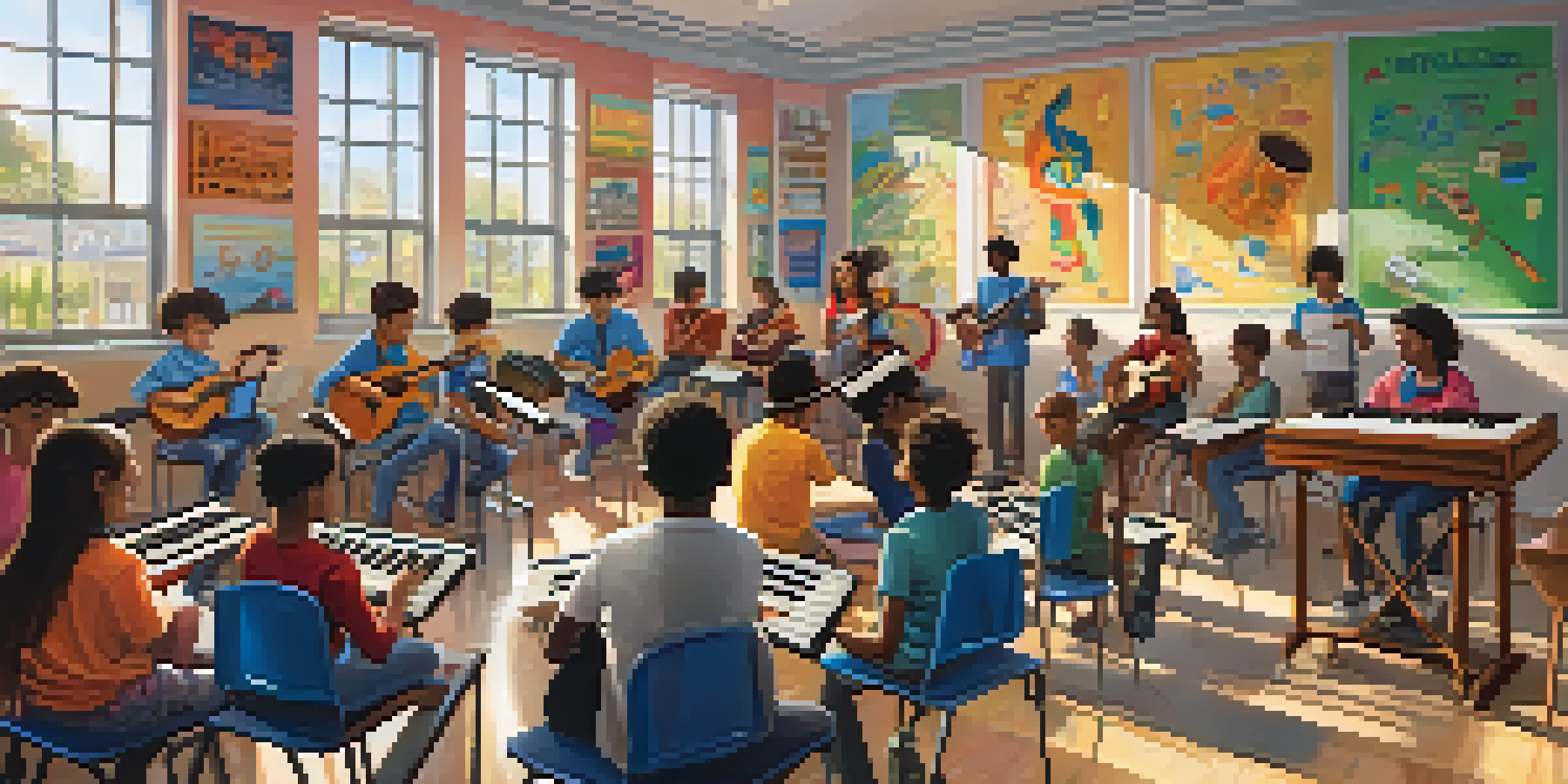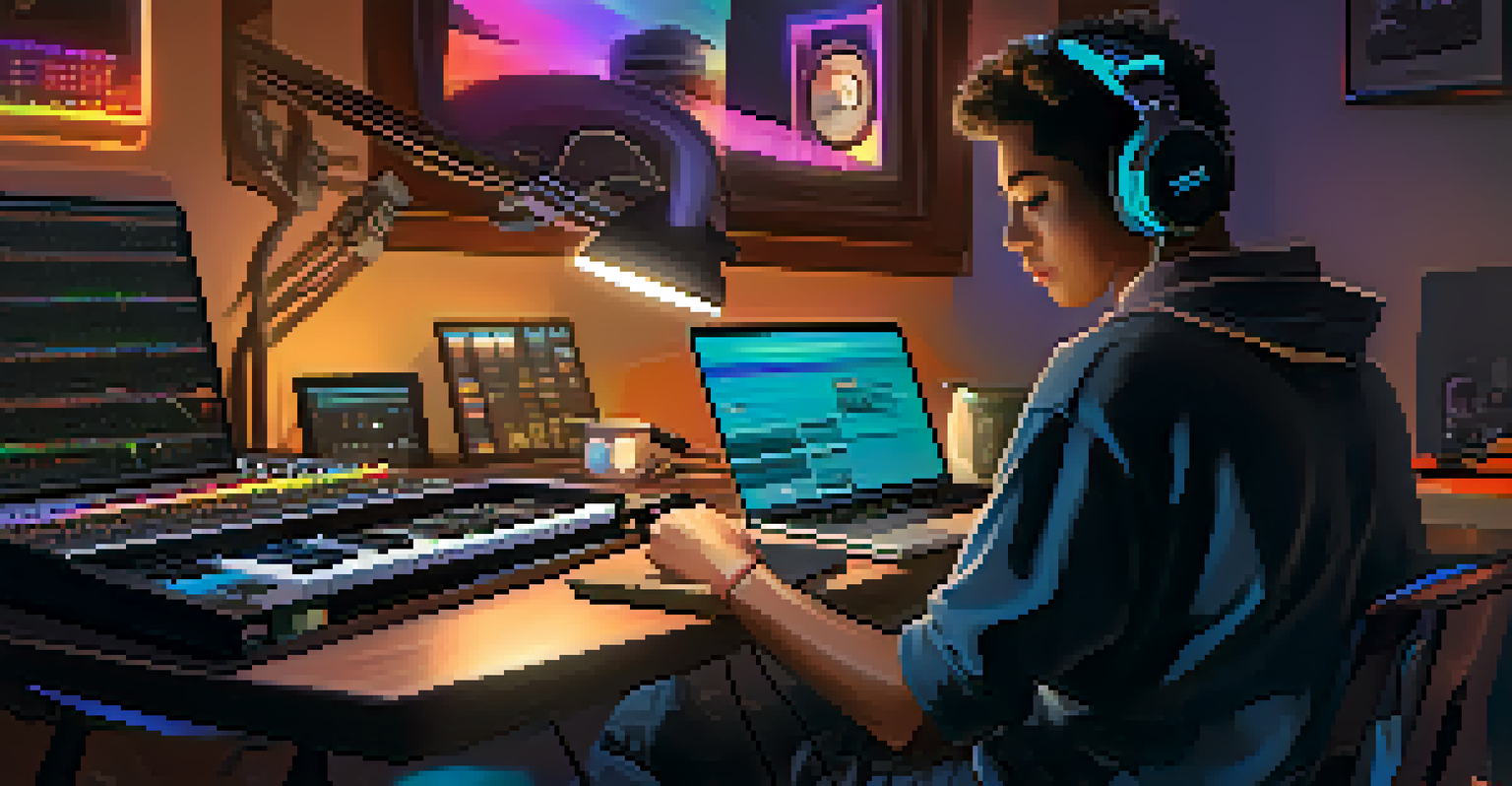Innovative Music Education Approaches in California Schools

The Importance of Music Education in Schools
Music education is more than just learning to play an instrument; it fosters creativity and critical thinking. In California, schools recognize that music can enhance cognitive skills, making it a vital part of a well-rounded education. By incorporating music into their curriculums, educators are preparing students for a future that values both the arts and STEM.
Music education is a vital part of a complete education. It helps children develop their full potential and become more successful in life.
Moreover, music education promotes teamwork and discipline—skills essential for personal and professional success. Students learn to collaborate in ensembles, which teaches them the value of working towards a common goal. This collaborative spirit translates into other areas of study and life, emphasizing the interconnectedness of disciplines.
As California continues to innovate its education system, music programs are evolving to meet modern needs. This evolution not only engages students but also finds new ways to integrate technology and diversity into music education, ensuring it remains relevant and accessible.
Integrating Technology in Music Education
Technology has revolutionized how music is taught and experienced in California schools. Digital tools allow students to compose, record, and share their music in ways that were previously unimaginable. For instance, software programs and apps enable young musicians to experiment with sound and collaborate remotely, breaking geographical barriers.

Moreover, online platforms provide access to a wealth of resources, from virtual lessons to instructional videos. This accessibility ensures that music education is not limited to the classroom; students can learn at their own pace and explore genres that resonate with them. This personalized approach to music education fosters a deeper connection to the material.
Music Boosts Creativity and Skills
Music education enhances cognitive skills and fosters creativity, teamwork, and discipline among students.
California educators are also using technology to enhance performance experiences. Virtual concerts and collaborations with professional musicians provide students with real-world exposure, allowing them to see the practical applications of their skills. This innovative approach not only boosts student engagement but also prepares them for future opportunities in the music industry.
Culturally Relevant Music Education
California's diverse population is reflected in its music education programs, which now emphasize culturally relevant pedagogy. By incorporating music from various cultures, educators help students connect their heritage to their learning. This practice not only validates students' experiences but also broadens their musical horizons.
The only thing better than singing is more singing.
For example, programs that include mariachi, hip-hop, or jazz not only teach musical skills but also provide historical and cultural context. Students gain an appreciation for the rich tapestry of musical traditions, fostering inclusivity and respect for different cultural backgrounds. This approach prepares students to thrive in a multicultural society.
Furthermore, culturally relevant music education encourages students to express their identities through their art. By allowing students to create music that reflects their personal experiences and backgrounds, educators empower them to find their unique voices. This self-expression is crucial for building confidence and encouraging creativity.
Project-Based Learning in Music Education
Project-based learning (PBL) is gaining traction in California's music classrooms, providing students with hands-on experiences. In PBL, students work on real-world projects that require critical thinking and collaboration, making learning more engaging and meaningful. For instance, creating a music video or producing an album can help students apply their musical skills in a practical context.
This approach not only enhances students' technical abilities but also fosters essential life skills such as problem-solving and communication. As students navigate the challenges of their projects, they learn to adapt and find creative solutions. This experiential learning prepares them for future endeavors, whether in music or other fields.
Technology Transforms Music Learning
Digital tools and online resources are revolutionizing music education, making it more accessible and engaging for students.
Moreover, PBL often culminates in a public performance or presentation, which boosts student motivation and accountability. Sharing their work with an audience allows students to take pride in their accomplishments, reinforcing the value of hard work and dedication. This sense of achievement can be a powerful motivator for continued engagement in music education.
Community Partnerships and Music Education
California schools are increasingly forming partnerships with community organizations to enhance music education. These collaborations often bring in professional musicians and educators to provide workshops and mentorship opportunities. By connecting students with real-world practitioners, schools enrich their music programs and provide invaluable learning experiences.
For instance, local arts organizations may sponsor music festivals or competitions that allow students to showcase their talents. These events not only foster a sense of community but also inspire students to pursue their musical passions further. Such partnerships can open doors to scholarships and other opportunities in the music field.
Additionally, community partnerships help to bridge the gap between school and real-world music experiences. Schools can leverage local resources to create unique learning opportunities, such as field trips to concerts or music studios. These experiences expose students to the vibrant local music scene, igniting a passion for music beyond the classroom.
Social-Emotional Learning in Music Education
Integrating social-emotional learning (SEL) into music education is a growing trend in California schools. Music provides a powerful outlet for students to express their emotions and connect with their peers. Through collaborative music-making, students learn empathy, resilience, and self-awareness—skills that are vital for personal development.
For example, group activities such as songwriting or ensemble playing require students to communicate and collaborate effectively. These interactions foster a supportive environment where students feel safe to express themselves. As they navigate challenges together, they build trust and strengthen their social bonds.
Cultural Relevance Enriches Education
Incorporating diverse musical traditions helps students connect their heritage to learning, promoting inclusivity and self-expression.
Moreover, music can serve as a therapeutic tool, helping students cope with stress and anxiety. Educators are increasingly recognizing the importance of mental health and are incorporating strategies that promote emotional well-being through music. This holistic approach to education nurtures both the mind and the heart, preparing students for a balanced life.
Future Directions for Music Education in California
As California schools continue to innovate, the future of music education looks promising. With a focus on inclusivity and technology, educators are adapting to the changing landscape of society and the arts. This adaptability ensures that music education remains relevant and engages students from all backgrounds.
Emerging trends, such as the incorporation of music production and digital composition, are shaping the next generation of musicians. Schools are recognizing the importance of teaching students how to navigate the digital realm, enabling them to thrive in a technology-driven music industry. This forward-thinking approach prepares students for a variety of career paths in music and beyond.

Ultimately, the future of music education in California hinges on collaboration—between schools, communities, and families. By working together to support innovative approaches, educators can cultivate a rich musical environment that inspires future generations. As these initiatives continue to grow, music education will undoubtedly flourish, empowering students to express themselves and connect with the world around them.